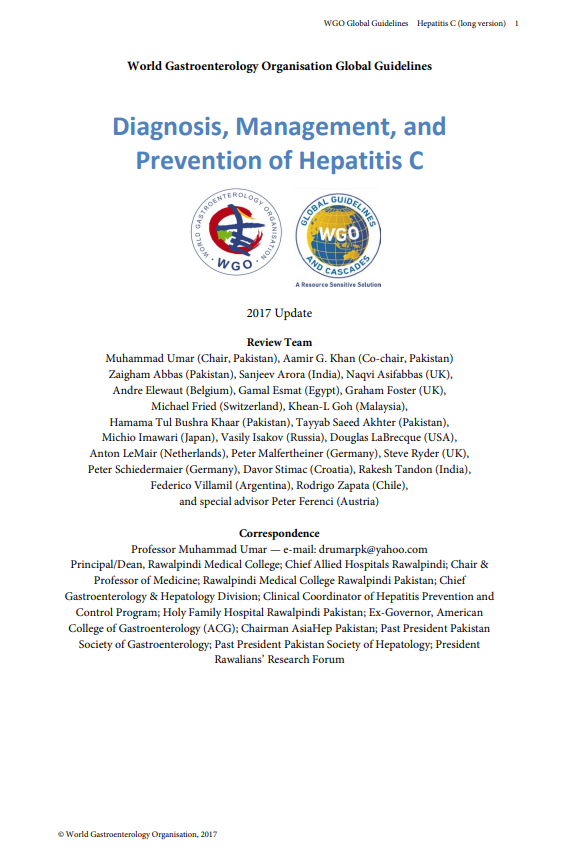
JRMC
Clinical Practice Guidelines

Diagnosis, Management and Prevention of Hepatitis C
2017 Update
World Gastroenterology Orgranization


Dr. Muhammad Umar, Editor in Chief of Journal of Rawalpindi Medical College, has been appointed as the first Pakistani Chairman of the World Gastroenterology Organisation (WGO) Committee for Treatment Guidelines for Hepatitis C. This nomination was made during the WGO meeting in Chicago, USA, in May 2011, Guidelines were developed over a year for adoption by member countries. He also serves as the Governor of the American College of Gastroenterology (ACG) for Pakistan and has authored Pakistan’s first book on Hepatitis C, along with five other books. Dr. Umar has held leadership roles in the Pakistan Society of Gastroenterology and GI Endoscopy and the Pakistan Society of Hepatology and authored the National Practice Guidelines for Hepatitis C in Pakistan.


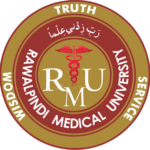
Finalized by The VC
National Guidelines
Acute Pancreatitis Guidelines
Treatment Guidelines 2021
This document outlines the evidence-based guidelines for managing acute pancreatitis at Rawalpindi Medical University (RMU) and its allied hospitals, issued on May 3, 2021. A key feature is the introduction of a new institutional severity assessment tool, the “RMU criteria,” developed from a 2019 pilot study on local patients to provide a more cost-effective and simpler alternative to existing scoring systems. This new criteria, based on 9 specific parameters, demonstrated a higher sensitivity of 93.1% compared to Ranson’s, BISAP, and APACHE-II scores. The guidelines provide comprehensive recommendations on the diagnosis, initial management including aggressive fluid resuscitation, severity assessment, nutritional support favoring enteral feeding, indications for ERCP, the limited role of prophylactic antibiotics, and the timing of surgical interventions for complications like infected necrosis or gallstone pancreatitis.
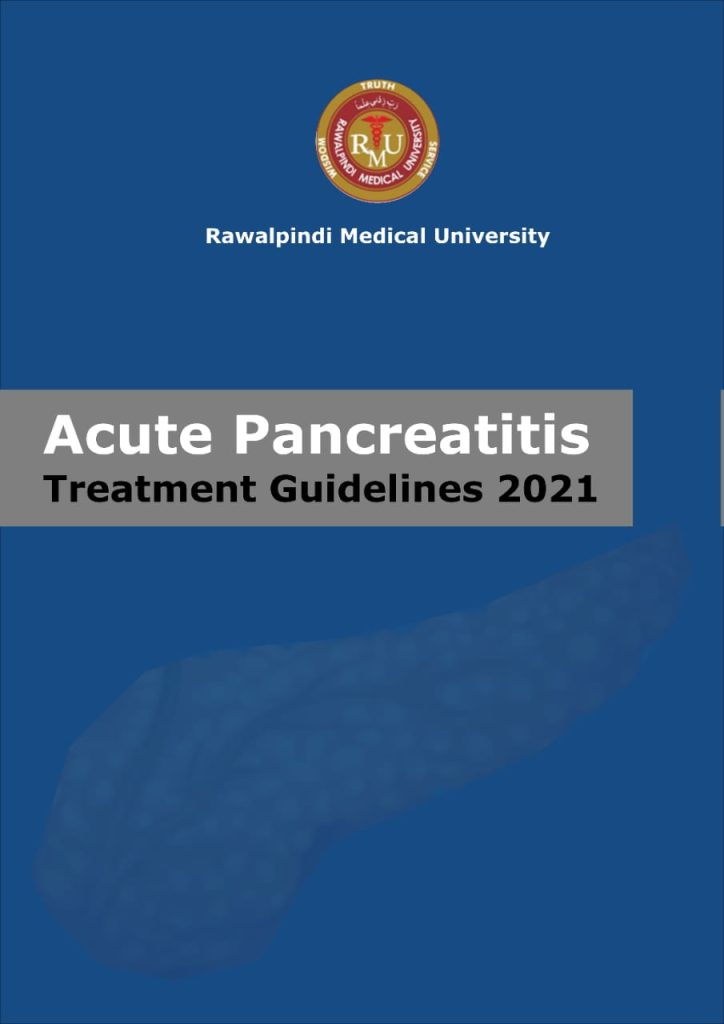
An Update on National Consensus Practice Guidelines for the Treatment of Hepatitis C & Literature Review in Epidemiology of Hepatitis C in Pakistan - 2022
Vol. 1 No. 1 | April 2025
Over the last 5 years there was some consistency in the treatment options and their availability of the new DAAs in Pakistan however quite a good data and research done locally and available online. Hence it was anticipated to review the available local data and update the previous version of the guidelines. The working
group on National Consensus Practice Guidelines(NCPG) of Centre for Liver and Digestive diseases under the mentorship of Prof. Dr. Muhammad Umar and Prof. Dr. Hamama-tul-Bushra Khaar reviewed the five-year data from 2017-2021. The team also kept into consideration the international evidence and western guidelines, including the updated AASLD and EASL guidelines for management of Hepatitis C and tailored the local guidelines with consensus from leading physicians and Hepatologists from different areas of Pakistan.
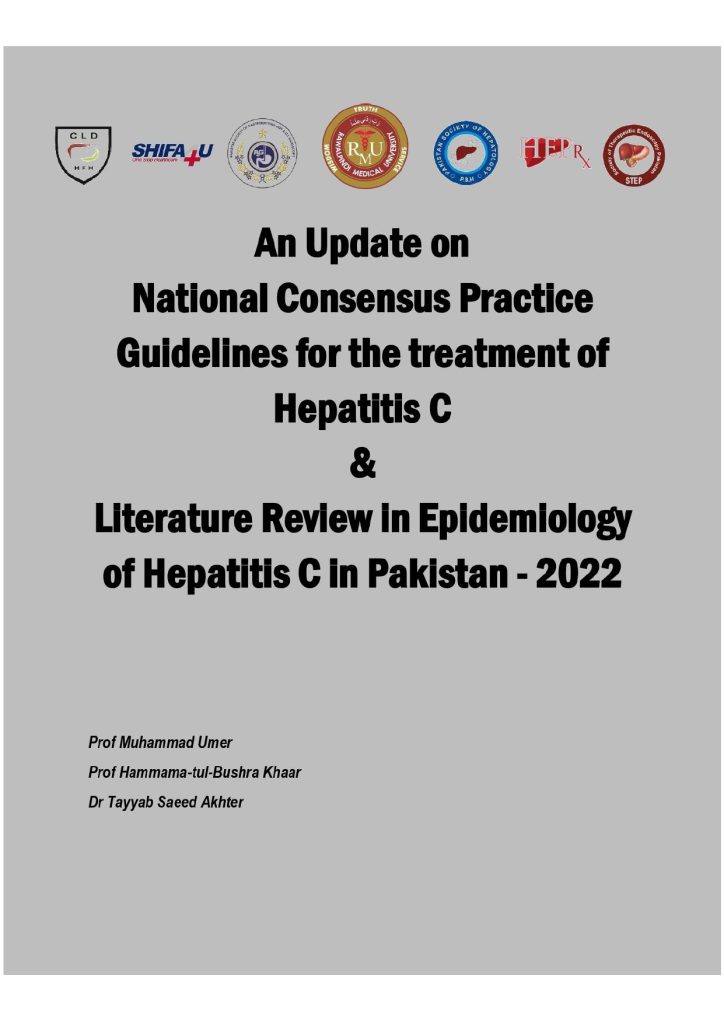
RMU Salmonella Infection Treatment Guidelines
Vol. 1 No. 1 | April 2025
Institutional Antimicrobial Usage Protocols is one of the most exciting initiative that Rawalpindi Medical University has taken. The threat brought on by antimicrobial resistance is a key factor driving this project. Salmonella treatment guidelines are produced through series of discussions held between Antimicrobial Usage Policy Committee including members of various disciplines. It involved a structured and intensive discussion process to ensure that content was carefully reviewed and coordinated for consistency.
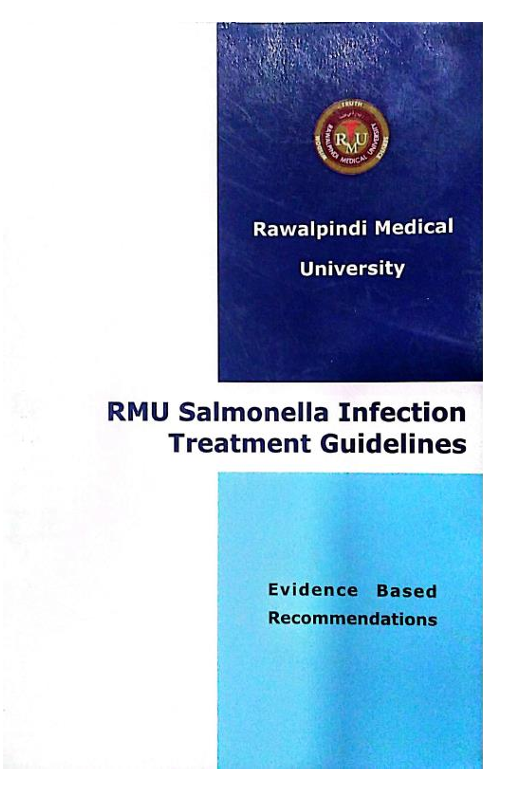
Antibiotic Treatment Guidelines for Intensive Care Units of RMU & Allied Hospitals
Vol. 1 No. 1 | April 2025
These are evidence-based recommendations for empirical antimicrobial usage in intensive care units of Rawalpindi Medical University and Allied Hospitals. Evidence is based on the available data of 2019 of antimicrobial resistance patterns seen in intensive care units.
Treatment should be reviewed clinically at 48-72 hours with the results of clinical findings, imaging results, microbiological cultures and other laboratory findings. Antimicrobials can then be stopped, switched to oral therapy, changed to a narrow spectrum agent or continued with further review.
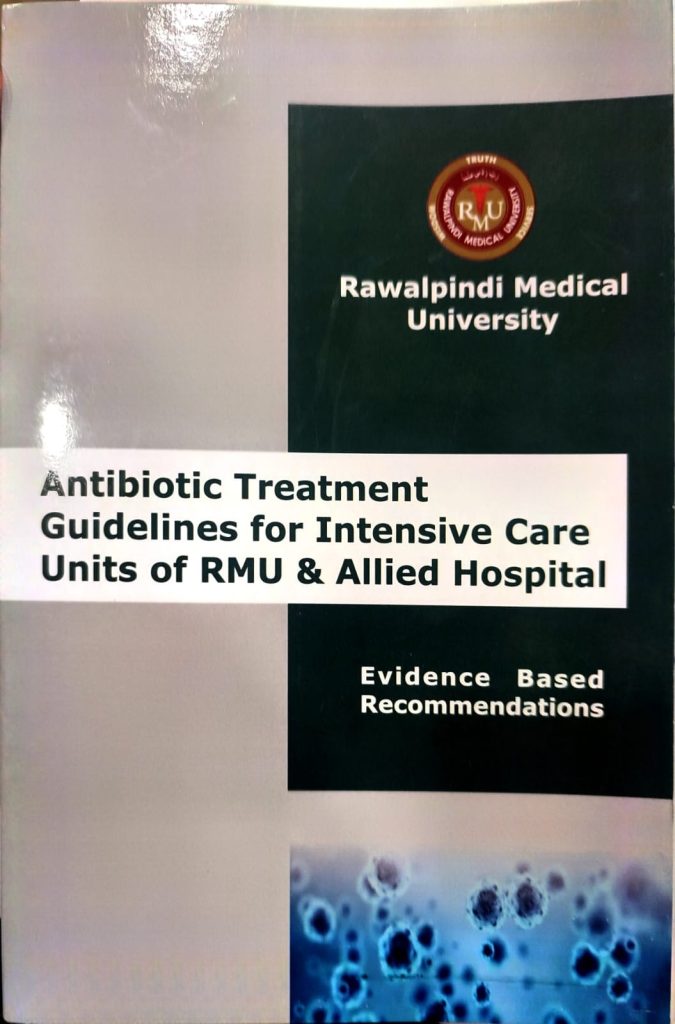
Journal of RMC
- The Journal of Rawalpindi Medical College (JRMC)
- Children Rights Journal of RMC (CrJRMC)
- RMU Journal of Health & Climate Change (JHCC)
- Journal of Nursing & Allied Health (JNAH)
- International Supplement of JRMC (IJRMC)
- Students' Supplement of JRMC (SJRMC)
- Residents' Supplement of JRMC (RJRMC)
- Covid-19 Special Supplement of JRMC
Our Guidelines
Copyright © 2025 Rawalpindi Medical University. All rights are reserved. | The content of this site is intended for health care professionals.
